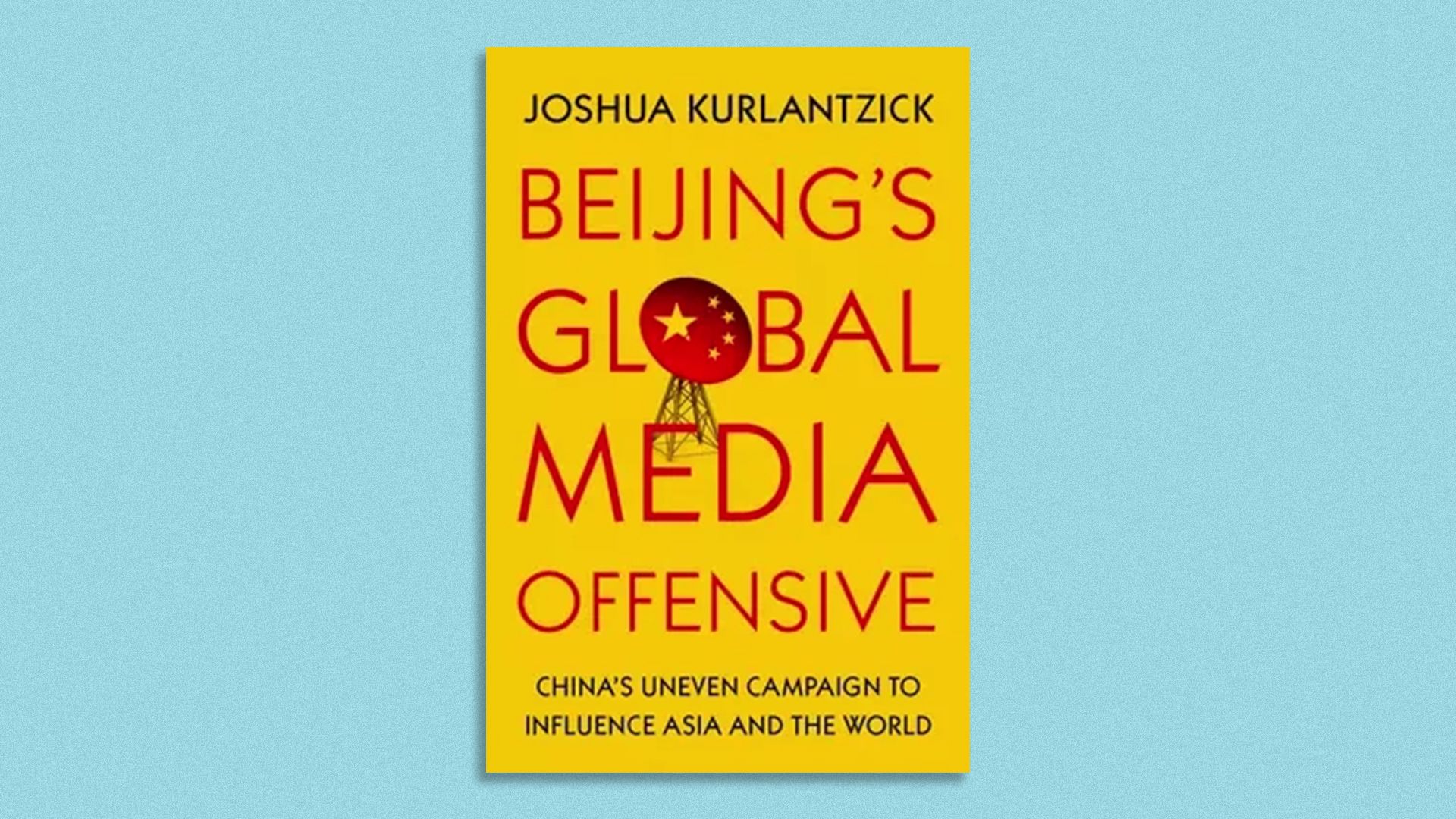Media
Beijing’s media power in Southeast Asia grows
|
|


Image credit: Oxford University Press.
The Chinese government has sought in recent years to increase its global media influence. In Southeast Asia, Beijing has found both success and failure in those efforts, according to a new book.
The big picture: “As China becomes more powerful, it is attempting to use its influence efforts to shape policymakers’ and publics’ views, in other countries, of their own political systems and leaders — not just of China but of politics in these other countries,” writes Joshua Kurlantzick, a journalist and fellow at the Council on Foreign Relations, in his book “Beijing’s Global Media Offensive.”
Details: Kurlantzick traces how the Chinese Communist Party has managed to expand the footprint of its media narratives through Chinese state media expansion and content-sharing agreements, quiet takeovers of local Chinese language outlets, and hosting journalist trainings.
- Kurlantzick also examines the history of Chinese soft power and sharp power campaigns in Thailand, Malaysia, Cambodia and elsewhere in Southeast Asia.
Some of these efforts have been successful. Xinhua, as a wire agency, has been able to expand its content-sharing throughout Southeast Asia, and many newspapers frequently run Xinhua content as part of their regular news.
- Most domestic Chinese-language media outlets in the region have either sold to Chinese companies or are now owned by people favorable to Beijing, Kurlantzick said.
Yes, but: Some efforts have failed. “Some of the state media is outright turgid and terrible, and it’s never going to have any appeal,” Kurlantzick told Axios in an interview.
- In addition, “the more authoritarian turn in China has turned off quality reporters from wanting to work at state media,” he said. That has made it far more difficult for state broadcaster China Global Television Network to achieve the kind of international status that Al Jazeera has, despite its major international expansion in recent years.
Media
Taylor Swift's new album apparently leaks, causing social media chaos – CBC News
The hype for Taylor Swift’s new album went into overdrive as it appeared to leak online two days ahead of its Friday release.
Swifties started sharing tracks on X that they claimed were from the singer’s upcoming album, The Tortured Poets Department, saying they came from a Google Drive link containing all 17 songs.
Some fans were upset by the leak and said they would wait until Friday to listen while others started frantically posting fake links on X to bury the “real” tracks.
“Raise your hand if ur an ACTUAL Taylor Swift fan and aren’t listening to leaks,” one user wrote.
Several media outlets reported that X briefly blocked the search term “Taylor Swift leak” on Wednesday.
CBC has reached out to Swift’s publicist for comment.
Swift announced the release, her 11th studio album and the first with all new songs since 2022’s Midnights, at the Grammy Awards ceremony in February.
Fans have been speculating about the lyrical themes that would appear on The Tortured Poets Department, based in part on a physical “library installation” that opened Tuesday in Los Angeles, curated with items that drop hints and references to the inspirations behind the album.
Swift’s 2022 album Midnights, which featured the hit Anti-Hero, also leaked online ahead of its scheduled release date, and went on to win the Grammy for album of the year. Swift’s previous albums 1989, Reputation and Lover also leaked ahead of their official releases.
The singer is in the midst of her billion-dollar-grossing Eras tour, which is moving through the U.S. and is scheduled to conclude in Vancouver in December.
Swift was added to Forbes magazine’s annual new billionaires list earlier this month, with Forbes saying she was the first musician to become a billionaire based solely on her songs and performances.
Media
DJT Stock Jumps. The Truth Social Owner Is Showing Stockholders How to Block Short Sellers. – Barron's
[unable to retrieve full-text content]
DJT Stock Jumps. The Truth Social Owner Is Showing Stockholders How to Block Short Sellers. Barron’s




Source link
Media
Taylor Swift's new album allegedly 'leaked' on social media and it's causing a frenzy – CTV News


Social media can be a divisive place, but even more so when it comes to Taylor Swift.
A Google Drive link allegedly containing 17 tracks that are purportedly from Swift’s eagerly awaited “The Tortured Poets Department” album has been making the rounds on the internet in the past day and people are equal parts mad, sad and happy about it.
CNN has reached out to Swift’s representative for comment.
The actual album is slated to drop at midnight Friday, but the claimed leak is both being hailed and nailed by Swift’s supporters.
One person shared a drawing of a young woman asleep in a sparkly bed with sparkly blankets on X, writing, “How I slept last night knowing I’m going to hear TTPD for the very first time tonight cause I haven’t listened to any leaks.”
Yet another person posted a video of two models walking and wrote, “Me and my bestie on our way to listen to #TSTTPD leaks.”
On Thursday, “Taylor Swift leaks” was a prevented search phrase on X.
The general consensus among those who have decided to be “leak free” appears to be that they are the true Swifties – as her hard core fan base is known – because they don’t believe the singer would have sanctioned such a “leak.”
Swift herself has gone to great lengths to prevent unintended early releases in the past.
“I have a lot of maybe, maybe-not-irrational fears of security invasion, wiretaps, people eavesdropping,” Swift said of her music during an 2014 appearance on” Jimmy Kimmel Live.” She added that her “1989” album only existed on her phone, “covered in cat stickers and the volume buttons don’t work very well because there’s candy stuck in there,” for nearly two years.
“The Tortured Poets Department” is Swift’s 11th album and comes after she became the first woman and only solo artist to win the Grammy for album of the year three times.
-



 Investment13 hours ago
Investment13 hours agoUK Mulls New Curbs on Outbound Investment Over Security Risks – BNN Bloomberg
-



 Tech12 hours ago
Tech12 hours agoSave $700 Off This 4K Projector at Amazon While You Still Can – CNET
-



 Sports11 hours ago
Sports11 hours agoAuston Matthews denied 70th goal as depleted Leafs lose last regular-season game – Toronto Sun
-



 Tech11 hours ago
Tech11 hours ago'Kingdom Come: Deliverance II' Revealed In Epic New Trailer And It Looks Incredible – Forbes
-



 Science13 hours ago
Science13 hours agoJeremy Hansen – The Canadian Encyclopedia
-
Business10 hours ago
BC short-term rental rules take effect May 1 – CityNews Vancouver
-
Art9 hours ago
Collection of First Nations art stolen from Gordon Head home – Times Colonist
-



 Investment10 hours ago
Investment10 hours agoBenjamin Bergen: Why would anyone invest in Canada now? – National Post





